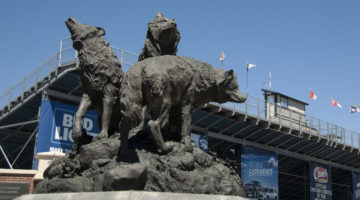By Brandon Fuhs
Student-athletes are some of the busiest students at the University of Nevada, Reno, and the time they put into their schoolwork and their sport shows their commitment. Then why is it that there’s still a looming question about how athletes are treated in classes?
First off, athletes miss class, and other students that aren’t aware of an athlete’s schedule might assume their absences are unexcused. The baseball team has five roads trips this upcoming season, and almost all of them conflict with Thursday and Friday classes. The girl’s volleyball team went on seven road trips this season, including tournaments, missing Thursdays and Fridays every road trip and sometimes missing classes on Wednesdays. The girl’s basketball team will have up to 10 away games on school days over the course of their season, depending on how well they do in the conference tournament. An athlete’s schedule is hectic during their respective seasons, and everyone knows how tough catching up is after missing even a few classes. It’s true athletes get priority registration for classes because of schedule conflicts, but traveling also causes athletes to miss out on classes eventually.
On top of athletes missing multiple days of school, they have different requirements to meet than other students enrolled at the university.
“They have their own college requirement,” said Paul Mitchell, professor at the Reynolds School of Journalism. “Then they have NCAA requirements to meet, as well as specific team requirements for academics. They are held to a different standard than other students.”
Team requirements include recording a certain number of study hours in Legacy Hall each week, meetings with advisers that include progress reports, having no unexcused absences in classes and other standards to assure an athlete’s academic success. The NCAA’s regulation on academics are not as strict as those provided by the university, but that’s only because of the standards the NCAA holds the school to.
The official NCAA website states, “The NCAA developed the Academic Progress Rate (APR), a system that provides a snapshot in time for each academic term, allowing schools to intercede and help academically challenged student-athletes before it is too late. The rate is team-based and accompanied by a penalty system that includes sanctions for teams falling below a prescribed benchmark.” These sanctions can range anywhere from fines to lost scholarships, and even termination of the sport if the team GPA is low enough. This NCAA requirement pushes Nevada to reach out to student-athletes, but the school does more than set standards for team GPAs and study hours.
Nevada has an academic staff solely for athletes, headed by Brenda Blackburn, the Associate Athletic Director for Academic Services. Her staff of academic advisers and administrative assistants work with students-athletes to discuss schedules for upcoming semesters, as well as helping students plan their time for studies during the current semester. The staff does more than just help students with their schedules: they teach athletes how to be successful students.
“I know a linebacker who tells me about his football schedule,” said Garrett Main, sophomore at the university. “He went up to the professor and introduced himself on the first day of class. He told him he played football and explained his schedule.” Introducing yourself to a professor is one of the most generic pieces of advice to give someone entering college, but that’s only because it makes a difference, especially because more students don’t talk to their professors than those who do.
“I know the professor is more lenient when it comes to grades,” Main said. Even if this is the case, it’s hard to ignore the effort shown by the athlete in Main’s class, and with all the team requirements and academic advising, it’s not hard to believe he puts effort towards his classes. That’s what college professors want from students. If they see the student engaged in class, actually communicating with the professor about assignments, they’re more often than not going to be lenient when they are grading the student. Of course not all professors do this for the more engaged students, but to think a professor is going to let an athlete slide by because of their title of student-athlete is almost insulting to the professor.
“I can’t say student-athletes are better students than others, and vice versa. It varies between each student,” Mitchell said. “But student-athletes are held to a higher standard.” Athletes will do what it takes to succeed in classes because they have requirements to meet in order to continue doing what they love, and in some cases, to continue attending the university.
“Given the circumstance of several GPA requirements, there needs to be a lot of focus from the athlete,” Mitchell said. “They’re not going to make it (through school) without the focus.”
Brandon Fuhs can be reached at sports@http://archive.archive.nevadasagebrush.com.











